创意阅读答案1至12
2024年部编版四年级上册语文期末复习专项12. 文学阅读与创意表达
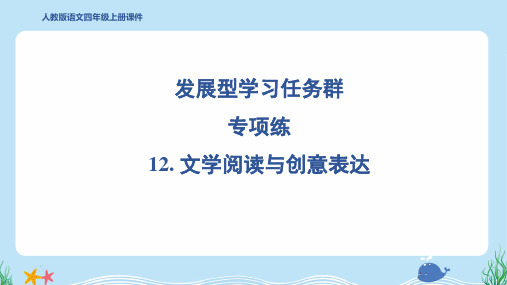
发展型学习任务群 专项练
12. 文学阅读与创意表达
阅读下面的文本,完成练习。 别了,我爱的中国
①别了,我爱的中国,我全心爱着的中国!我倚在高高的 船栏上,看着船渐渐地离岸了,船和岸之间的水面渐渐地变宽 了,我看着许多亲友挥着帽子,挥着手,说着:“再见,再 见!”我听着鞭炮噼噼啪啪地响着,我的眼眶湿润了,我的眼 泪已经滴在眼镜面上,镜面模糊了。我有一种说不出的感动!
那时候还没有退出中国海,还没有被我们赶出去,那么,来,
勇士们,我将加入你们的队伍,以更勇猛的力量,去驱逐它们,
毁灭它们!
这句话在文中出现多次,
⑧这是我的誓言!
有什么作用?
⑨别了,我爱的中国,我全心爱着的中国!
资料链接:本文写于1927年,作者是郑振铎。当时的 中国,正处于民族存亡的关键时刻。郑振铎为避开国 民党政府的压迫,毅然决定出国去西欧游历,在离开 祖国之际,他写下了一组感人的文章——《离别》, 本文是其中一篇。
5. 若想深入理解郑振铎立下此誓言的原因,要查找资料,
以下哪一项不适合?( C )
A. 《离别》
B. 《郑振铎传》
C. 《中国儿童视听百科·飞向太空》
6. 文章批注框中的问题是从哪个角度提出的?选一选并作出回 答,然后选择一个角度,提出一个你认为最值得思考的问题。 A. 针对文章内容 B. 针对文章写法 C. 联系生活经验 (1)批注框中的问题是___B____提出的(填序号),我的答案是: _这__句__话__反__复__出__现__,__强__调__了__“_我__”_对__祖__国__的__热__爱__和__不__舍__之__情__。_ (2)我的问题是_示__例__:__A__提出的(填序号),问题是:_______ _第__⑤__段__中__,__作__者__为__什__么__说__自__己__“__真__是__一__个__罪__人__”__?_______
大学创意阅读第四册答案

Unit 1Understanding the textPart A1.Most voice-over artists work in advertising. They provide the voice for the images used to sell a product.2.They must have a good voice and be good actors. They must be able to modulate their voice.3.The pay can be good but it is not easy to find work.4.It‘s finding work. You do not become famous even your voice is good. Nobody knows what a voice-overartist is or what he does. You have to strike a balance between finding work and over-exposing your voice. Part CDeveloping your skill11 8 3 6 5 10 7 9 2 1 4 Extending your vocabularyUnit 2Understanding the textPart APart BPart CDeveloping your skillsPart BUnit 3Understanding the textPart A1.b)2. The tone and style of the text, especially the rhetorical questions;the last paragraph;the constant use of the word ―offers‖;3. They are asked by a potential customer of the health club except the last one, which is asked bythe health club.4.Can anybody do it?Part B1.People are more a ware of the importance of keeping their body healthy, but this is not easy,so gym clubs are becoming popular.2.It is an exercise system used by some famous people, which is safe and makes you healthyand fit.3.―Can anyone do it?‖Yes, because there are many different options, which are designed to suit each individual4.Apart from the regular fitness and exercise lessons, we offer other, slightly different options.5.The fact that our approach is based on the needs of each individual.6.Your first class is free, so contact us now.Developing your skills●When will mankind realize that enough is enough? Will mankind ever realize that the planetcannot support an infinite number of people?(a)●Have you ever seen anybody walking around with his head under his arm? Do you ever lieawake at night and hear strange noises coming from empty rooms?(b)●Have you ever stopped in the middle of a sentence because you couldn‘t find a word?Did you ever wish that you knew every word in existence?(b)●Do you sometimes wish that you could buy anything that you wanted? Do you sometimes seesomething and just wish that you had enough money to buy it?(d)●Do you ever feel tired at the end of the day and think that there is something wrong with you?Don‘t you wish that you had more energy to do the things you really want to do?(b)●Has it come to your attention that there are more natural disasters happening in the worldlately? Have you ever asked yourself why there are```?(c)Unit 4Understanding the textPart Aa.the oldest university in the world (which is one of the oldest universities in the world)b.twelfth (thirteenth)c.each specializes in a particular subject (none of them specialize in a particular subject)d.and 90% of them come from public schools (and 90% of them used to come from publicschool)e.Littlewood Pools (the managing director of Littlewood Poolsf.bikes (cars)g.female (all)h.the dons are not allowed to walk on the grass ( only the dons are allowed to walk on the grass) Part BPast: Selection based not only on the entrance examination.Large percentage of public school studentsStudents offered places because they were good at sportsSports teams were betterDonations came from the church.Present: Selections based on A levels and interviewMore places for students from state schoolsStudents accepted on academic merit onlySports teams are not so good as they used to be.Developing your skillsExtending your vocabularyPart Aread gown formal hall dean donsPart C:c e b a f dUnit 5Understanding the textPart ADeveloping your skillsExtending your vocabularyUnit 6Understanding the textPart A1.allow the coat to be delivered and stored in the cellar.2.the toilet was outside at the back of the house and he was afraid.3.his father could not walk, so he could not get a job. Also, there were no state benefits at thattime for unemployed or sick people.4.they knew his father would not accept the money, even though he needed it very much, as hewas too proud.5.would otherwise have been thrown away/ could not be sold in a shop/ other people gave tothem.6. a tap in the cellar.7.they never complained and always tried to help out in any way they could.8.he then saw so little of him9.that no matter what difficulties a family had, the children must never find out about them orsuffer in any way.10.his father had overcome such enormous difficulties, such severe problems, to give his family agood life.Part B1.The Good Ole Days/Life‘s a Gas / Aren‘t I the Lucky One?2.Because it is luxurious and contrasts with his description of his earlier life.3.Regretful reminiscence of the beauty to be found in poverty. Regretful because the writerwishes he had appreciated the truly important things in his life, which is unrealistic. It is also regretful because(as we learn in the last couple of sentences) the author‘s father has just died.Developing your skills1.The writer was feeling rather emotional- for several possible reasons which the reader, at thisstage, is not certain of but which he can assume he will find out later in the text.2.One sack was a very small amount; probably everybody else was getting much more.3.The writer‘s family was so poor that they could never afford to buy biscuits; he had neverseen whole biscuits, only the broken ones rejected by the factory and brought home by his mother.4.The writer‘s family was not that unusual; most families were suffering hardships of somekind.5.It shows us that writer was not really busy at all—it was simply an excuse for not visiting hisparents more often.6.It obviously shows us he is upset, but it also asks us to consider why he is upset.(Because hisfather has died, he misses his childhood, he misses his father, he is ashamed of not having seen his father more… All of these?)7.The writer‘s father has just died.Extending your vocabularyPart AUnit 7Words to note: 7, 11, 15, 5, 21,, 23, 1, 9, 2, 4, 25, 18, 3, 6, 8, 13, 24, 16, 22, 14, 12,20, 19, 17, 10Understanding the textPart A: Comprehending the text1.it has had a great influence on society.2.many different theories are advanced to explain the discoveries.3.his belief that since the Greeks could invent a complicated computer like theAntikythera Mechanism, they could have invented anything.4.by the Chinese in 723 A.D.5.fish and lightning.6.records of a barber who moved the marks left to identify a slave, skin grafting,operations to repair ears damaged by wearing too heavy earrings, the production andsuccessful use of artificial limbs and the use of false teeth.7.that of ancient China.8.the pace at which they develop.9.inventions are being developed, improved and even replaced more and more quickly.Part C: Interpreting the text1.Because it was thought that electricity was discovered much later than this period.2.To show that inventions are not necessarily a modern phenomenon but have beenmade throughout history and in several cradles of civilization.3.To show that they are being made , and improved upon, at an increasing rate, and thatsome of them depend on much earlier inventions.4.Many inventions thought to be ―modern‖ actually depend on earlier discoveries orinventions.Developing your skillsExtending your vocabularyNow use one word from each group of words (i.e. each row of the table) in sentences of your own.1.Te ingenuity of the Chinese has not been surpassed in the history of invention.2.In comparison to other civilizations, roman homes were luxurious.3.Inventions made in ancient times have greatly influenced modern progress.4.It is incredible that the Greeks could have invented a computer.5.Even though it was incredible at the time, the Greek computer was quite complex.6.Professor Solla proved that the Antikythera Mechhanism was, in fact, a computer.Unit 8Understanding the textPart A1.Charlie and his brother were sent to a workhouse, which was an institution for very poorpeople. Then they were separated from their mother because the workhouse was divided into male and female sections.2.He was a little man with baggy trousers, big shoes, a hat and a moustache.3.This was because of his father‘s connections. His father had worked as an actor before hebecame a drunkard.4.The Pawnshop, The Immigrant, The Janitor and The Floorwalker.5.Adrienne did simple, unskilled jobs at the United Artistes studios.6.To make sure that actors got a fair deal.7.They wanted to start a war with America. They thought that killing Charlie, who was at thattime a successful and popular American film star, would start the war.8.He was exiled to Switzerland.Part B1.of them learned to laugh at their own hardships.2.Charlie‘s early life formed him as a person and provided the basis of his humor3.he had never forgotten the sadness and hardship of his early life4.celebrities and politicians such as Frankiln D. Roosevelt, Churchill, Einstein and the Prince ofWales were all Charlie‘s friends. Even some Japanese terrorisrs thought that killing Charlie would lead to a war with the United States.5.he might not have been able to get over losing his mother at an early age. He seemed to spendthe rest of his lige trying to compensate for that loss in one way or another.6.Charlie never forgot where he came from. He was always speaking up for‖the common manin the street‖.7.she said that McCarthy was dreadful.8.he was always on the side of the poor in his films and nothing that happened in his personallife could spoil the simple but wholesome humor of this films.Extending your vocabulary1.exiled2.poignant3.orphan4.prizefightersedian6.baggy7.wholesome8.tramps9.stunt10.terroristsUnit 9 Understanding the textPart BDeveloping your skills1.The verb‖claimed‖is the clue. The writer is a bit surprised and he does not completelybelieve what the vicar said.2.The question is a rhetorical question. It shows that the writer has doubt about the issue. Thewriter thinks that John Walker and Sharp might be innocent and what James Graeme had claimed might not be true.3.The writer‘s attitude towards the supernatural is still open. He thinks that more effort has to beput into investigating the issue.4.The verb ―seems‖is the clue. The writer is glad to see that the work done by EdinburghUniversity is fruitful, but he also thinks that this is not enough and more effort has to be made.Expanding your creativityMost ghost stories are based in castles or churches because they are old and many people have died in them. Graveyards are also good settings for ghost stories(MichaelJackson‘s ―Thriller‖ video is a good example, where ghosts and ghouls come out of thegraves and dance with him). A good idea could be where a new house has been built toreplace an old one which has been pulled down; the ghost is unhappy because its househas been destroyed. Another starting point could be a ―séance‖ or a game with a Ouijaboard, with letters around the table. People place their fingers on a glass which movesaround the letters to spell a message from‖ beyond‖. People who have done this alwayssay they have not ―pushed‖ the glass and that it moves ―on its own‖.●Indeed , the thunder and violence seem to be the reason for any scary bit of a film beingshown in a storm! Perhaps the reduced visibility could be another reason – if you can‘tsee clearly, you can imagine things that you have seen! You could try to encouragestudents to envisage a ghost story in other climatic conditions.●Usually at night and in the winter. Ghosts seem to be associated with coldness andpeople often say, when they have had paranormal experiences, that they feel cold. Again, try to encourage students to be different.● A single event will need to be placed in an historical context to explain why the ghosthas ―come back‖ from the dead. Also , one single event could be explained ―normally‖so perhaps a series of encounters may be better.●Usually old characters, with a violent history, but this could just be because more oldpeople die! Students could try to compose a story with a young ghost, for a change.●Quite a few films have used friendly ghosts, and these are usually funny films. WhoopGoldberg in Ghost is one example, where the man becomes a ghost after he is killed andcomes back to help his girlfriend to solve his murder. Another example is The SixthSense with Bruce Willis. Ghosts often come back to help members of their family; theseare not always scary.●One theme could be that ghosts, unlike in most ghost stories, can actually be nice andkind and not frightening or evil. Another theme could be that ghosts can be happy aftertheir death, and that dying is not something to be scared of – a positive image of lifeafter death.●Old forms of language could help to show that the ghost died a long time ago. Underhypnosis, some people have used forms of a foreign language that they couldn‘t possiblyhave known, although this is a different king of ―ghost ‘story as the ghost ―lives‖ in thebody of the person under hypnosis.●You could suggest a ghost of an animal—a dog, for instance. The ghost could havecome back for a number of reasons: to help somebody, as mentioned before, or forrevenge because of a death caused by somebody else who is still alive. Then ghost couldhave forgotten something and needs it for life in his \her new world.●There is not any fixed principle. However, the general understanding is that the storymakes a makes a more lasting impression on the audience if there is a surprise ending.●The story will leave a sense of mystery if it involves elements which cannot beexplained, and this will make a lasting impression on the audience.Unit 10Words to note: 24, 8, 13, 18, 22, 4, 1, 20, 10, 16, 2, 6, 23, 3, 21, 5, 19, 12, 9, 15, 17, 14, 7, 11.Understanding the textPart A:Story one1.----he had left his trusted hunting dog to guard him.2.----he could not see his son and the dog‘s face and mouth were covered in blood.3.----he saw his son safe and sound and the body of a great grey wolf nearby.Story two4. ----tourists would come to see the stones and would need somewhere to stay.5. ----his plan was very clever and designed to trick people.Story three6. ----they insisted that the king‘s choice would not be accepted if he chose one who spoke English, and therefore they thought the king would have to choose a Welshman.7. ----the king chose his baby son who, although he was an English, could not speak any language, and therefore could not speak English.Part B: InterpretingDeveloping your skillsAnswer:1.Maldwyn left his trusted hunting dog to look after his beloved son while he went hunting.2.Strong hunter, unthinking but not necessarily stupid, man of action not thoughts.3.He loved his dog and trusted him.4.He was relieved that his son was not dead but very sad that he had killed his dog.In pairs, discuss:1.There are no fixed answers. But personally, I would have felt very guilty because of myunforgivable mistake.2.The same thing or something different? Find and rain another dog or never want another dogto keep the memory of Gelert sacred. Educate my son to love dogs.3.If dogs have the ability to forgive, I am sure that Gelert would understand that his mastercared more about his son than his dog and was overcome with grief and he would certainly forgive him!Extending your vocabularyPart A: Clues:1.cradle2.rogues3.independent4.fertile5.keen6.mound7.prosperity8.growling9.regrets10.bravery11.rare12.unjustlyNow use the hidden word in a sentence of your own:I think contemporary songs are not as good as the ones in the old days.Part B:1.flock2.bunch3.regiment4.class5.herd6.troupe7.fleet8.flockList:1. a pair of shoes2. a gaggle of geese3. a troupe of elephants4. a school of fish5. a brace of rabbits6. a group of peopleUnit 11Words to note: 6,11,1,14,2,9,18,21,16,20,8,17,10,12,19,3,7,13,24,26,4,23,15,5,27,22,25Understanding the text:Part B: Understanding strength of opinion1,2. generally agrees3. generally disagrees4. totally disagrees5. give no opinion6. generally agrees7. totally agrees8. totally disagreesDeveloping your skillsExtending your vocabularyPart A: words to note: cloze sentences1.culinary2.poverty3.superficial4.intrigued5.effeminate6.rivalry7.pubs8.devastationPart B: words to note: antonyms and synonyms TangibleFanaticalIntriguedLiberalVulgarMiserlyPovertyRefinedRivalrySuperficialChoose:1a. My students seem bored with grammar exercises.1b. (see ―words to note in context‖ section above.)1c. My son is fascinated with football.2a. The European Union is seeking greater cooperation between member countries. 2b. (see ―words to note in context‖ section above.)2c. There is a certain amount of historical enmity between European countries.Unit 12Words to note: 4,22,12,8,18,15,1,10,19,3,13,6,11,21,2,9,5,14,7,17,20,16Understanding the textPart A: comprehending the textTrue: 2,9,10,15False: 1,3,4,5,6,7,8,11,12,13,14Part B: Summarizing the textDeveloping your skillsMatch:5,9,3,1,7,8,4,6,2,Complete:1.make an all-out effort2.escapes me for the moment3.give my word of honor4.gone beyond a joke5.made my hair stand on end6.skating on thin ice7.thrown in at the deep end8.work to rule9.an iron hand in a velvet glove Choose:1.OK team, we are losing 2 to 0 and we‘ll need to make an all-out effor t, if we are going to winthis game.2.It really made my hair stand on end when you told me about your experience in thegraveyard!3.Your constantly interrupting me when I‘m talking has really gone beyond a joke now. Extending your vocabularyPart B:1.acute2.excessive3.profound4.deep5.severe6.fierce7.extreme8.powerfulChoose:1.I always suffer acute anxiety when I have to fly in a plane.2.He has suffered from severe depression for years, ever since his mother died.3.I sometimes get a powerful sensation that I have been here before, and I know it‘s not true.Unit 13Words to note: 12,9,1; 22,17,3; 11,5,19; 20,8,15; 2,13,18; 21,4,16; 14,23,10; 6,7.Understanding:Part.A.1.----Broadcasting lessons through the television and radio.---- Using modern telephone services.----Using facsimile machines.----Using satellite technology.----Using the Internet2. ----Trying satellite transmissions3. ----Delivering tapes of the broadcasts4.---- Making face-to-face contact with each student once a year: Teachers visit students orstudents attend mini-schools1----telephone; 2----video; 3----radio; 4----satellites;5----Internet; 6----facsimile; 7----audios.Part. B.1.i----2c----3e----4b----5a----6g---7h----8f----9d1.----Established The Correspondence School, School of the Air, three regional stations and 19Distance Learning Centers.2----Provided educational services in a more efficient way (than correspondence).3.---provides quality distance education services and flexible delivery of course to a wide varietyof institutions and clients by employing educational and technological specialists to write, broadcast, distribute, coordinate and market distant education services and materials.4. ---Creates and delivers educational materials to every school in Western Australia and to everyremote learning area.Unit 14Words to note:20, 14, 7; 1,11,3; 5,24,28; 16,2,9; 26,13,21; 4,8,6; 27,25,12;10,15,17; 23,19,22.Understanding:Fears and worries: ----He thought he might be ―on the scrap-heap‖.-----He thought he might be considered ―of no use‖.----How would he manage financially?----He was nervous of having the official status of being ―retired‖.Positive Expressions:----―jam-packed‖ with things to do------He had already retired once, and enjoyed the changes it brought about,the new country, etc.-----Money is not a real problem--- he already has a good ―package‖ from before.----Has enough time to do all the things he has been putting off ―until tomorrow‖The writer is very positive about his retirement.Part. C.1.Because he doesn‘t feel ―old‖, he still feels life is to be enjoyed to the full.2.Because they were trying to tease (in a way bully) Albert because he was quiet but he hadmade them realize they had not accurately understood his character at all--- they were embarrassed.3.To provide examples of seemingly meaningless or very unimportant incidents that are soclearly remembered when the more important events of his life seem to be forgotten. This shows us that, perhaps, it is the accumulation of these seemingly unimportant events that shape and mould our character and our life.4.It means that the past and future always seem to be more enjoyable, more exciting than thepresent. The present always seems a disappointment.5.He is saying he hopes that he will always be too busy doing things, enjoying the present andthinking about the future, to spend much time looking back and being nostalgic.Unit 15Words to note:17,9,1; 22,12,4; 14,2,20; 23,6,3; 15,5,21; 13,8,7; 18,11,10; 19,16.Understanding:Part A. 1. … Persia, Arabia, India and Egypt.2. … he had left something in the palace.3. … they had betrayed him.4. … more than a thousand lovely young girls.5…. The thieves beat him and cut off his fingers, and he didn‘t want to suffer any more.6… merchants when they went to Ali Baba‘s house.7….pouring hot oil on their heads one by one.8…. He enjoyed listening to her stories and always wanted to hear the endings, which were given the next day.Part B.Before listening…..---mad---killed innocent girls---lost wisdom to rule his kingdomAfter listening…….----stopped killing innocent girls----appreciated his wife‘s talents----realized that not all women were wicked and faithless----realized that he must put his kingdom in order again----able to rule his kingdom wiselyPart C.1.Sir Richard Burton----translated the stories into English2.King Shahriah ----betrayed by his wife and maidservants----became mad.----killed one innocent girl (his new wife) everyday----married Sheherezade----realized his own fault because of Sheherezade3.Sheherezade -----took the initiative to marry King Shahriah so as to convert him.-----told the king part of a story each night.-----successfully converted the king4.Ali Baba -----overheard the magic password and stole the 40 thieves‘ money and treasure-------killed all the thieves and lived happily as a rich man for the rest of his life.5.Ali Baba‘ brother---- overheard the magic password---- caught by the thieves-----killed by the thievesUnit16Words to note:1. flip aside (12)2. absorb (20)3. benefit (25)4. breakthrough (7)5. capitalize on (2)6. confront (15)7. conscript (9)8. disillusion (4)9. elite (14) 10. entrepreneur (28)11. fundamentalist (19) 12. glittering (17) 13. gospel (3) 14. icon (6) 15. indecent(23) 16. insecure(24) 17. merchandise(27) 18. mobility(21) 19. moral(8) 20. naïve(10)21. predominantly(22) 22. privileged(26) 23. rebellious(11) 24. recruit(1) 25. stem from (18) 26. suggestive(5) 27. unsophisticated(13) 28. venture(16)Understanding the text:Part A: Comprehending the text1.Some people cannot accept the fact that Elvis Presley is dead because they are too muchinvolved in his life and career.2.Elvis was influenced by the music of the American blacks because in Tupelo, where Elvis wasborn, many inhabitants were descendants of the African salves who had brought the musical traditions with them from Africa.3.In Tennessee, Elvis had exposure to different kinds of music because he attended churches ofthe area, where he experienced both the music of the white Christian fundamentalists and the blues and gospel music of the blacks.4.Elvis and his family moved all the time because their economic situation was unstable.5.The first records made by Elvis in a local recording studio sere significant because this let himcome across Scotty Moore and Bill Black.6.We know that Elvis was not popular at the beginning of his career because his first recordsmade in a local recording studio were not really profitable.Developing your skillsParagraph1: introduction to the background of Elvis PresleyParagraph2: Elvis‘s childhoodParagraph3: Elvis‘s career at an early ageParagraph4: Early development of Elvis‘s music careerParagraph5: turning point of Elvis‘s music career.Paragraph6: reasons for Elvis‘s successParagraph7: Elvis being an ordinary personParagraph8: The golden age of Elvis‘s music careerParagraph9: Elvis‘s military serviceParagraph10: reasons for Elvis‘s declining popularityExtending your vocabularyPart B: elite, a breakthrough, confronted, disillusion, suggestive, rebellious, predominantly, insecure, naïve.Part C: c, e, g, a, f, b, dUnit 17Words to note: 9, 15, 1, 6, 20, 12, 2, 8, 3, 18, 4, 19, 16, 13, 24, 21, 5,2 3, 17, 7, 14, 10 Understanding the text:Part A:Answer to question1: not very seriously.Answer to question2: it is less of an exception than it used be.Answer to question3: it is possible for a non-Chinese observer too see any change.Answer to question4: the general patterns of behavior university students in China…Answer to question5: the students in the West are less respectful…Answer to question6: be more like Albert Einstein.Answer to question7: teachers would be very happy…Answer to question8: it suggests that s/he has not been listening to…Part B:1.it means that people who have a skill and can do something practical and productive, do justthat---they produce something. However, people who cannot do anything practical orproductive, teach people how to do so.2.he is asking the reader to assume that the behavior of the students genuinely reflects theirinner thoughts and opinions. In other words, that the respect they show outwardly to teachers is a product of the respect they actually feel for them.3.he is suggesting that when a student questions a teacher about some aspect of the lesson, it isthe information , not the teacher that is being questioned---therefore, it is not disrespectful to the teacher.4.he means that education should not simply be a matter of a teacher giving information and astudent receiving. The students and teacher need to interact, exchange ideas, argue, etc. for effective education to take place.5.he says that this is a sign that the student is aware of his or her thought process. He also saysthe students‘ classmates may also be confused and so would benefit from his question. Finally, the teacher would appreciate the question as it shows the students has been listening carefully—to know you do not understand something. You must have tried to follow the argument being presented.Extending your vocabularyPart A:Conducive, passive, erroneous, disregard, clarify, faulty, escalate, erode, commonplace, radicallyUnit 18Words to note: 16, 5, 1, 11, 8, 28, 13, 2, 10, 15, 3, 24, 21, 19, 26, 4, 14, 9, 6, 27, 25, 7, 12,, 17, 23, 20, 22, 18Understanding the text:Part A: 1. establishing a ―franchising‖ system2. giving gifts such as Hello Kitty and world cup dolls3. presenting the restaurant as a wholesale place for family get-together4. opening the Ronald McDonald house charities organizationEnsuring maximum use of sustainable and recyclable materialsSupporting environmental organizations5. insisting on system that work in their franchisees‘ interests, which is a near-watertightguarantee of high standards of hygiene6. providing low-fat or even entirely non-meat mealsPart B:1.–McDonald brothers ran a restaurant in San Bernardino--The restaurant sold huge quantities of food and drink on the basis of…2. –He discovered the restaurant in California with a winning formula.--He put the idea of a chain of restaurants selling huge quantities of food and drink …3. –one of the marketing strategies was applying the McDonald nam e to food items…4. –In these regions, McDonald‘s was able to introduce its techniques in an approach similar to what they had use in the 1950‘s and 1960‘s in the US.。
文学创意写作_岭南师范学院中国大学mooc课后章节答案期末考试题库2023年

文学创意写作_岭南师范学院中国大学mooc课后章节答案期末考试题库2023年1.根据孙方友的微型小说《工钱》改编的微电影,获得了2002年电视金鹰奖“最佳电视短剧奖”,它的获奖得益于()。
参考答案:新颖深刻的文学创意2.获得2012年首届滨海国际微电影节最佳作品奖的《香水有毒》,它采用了()故事情节的叙述方法。
参考答案:折叠+跳移3.微电影《老人愿》生动刻画了女儿、父亲、男友3个人物的鲜活个性,其成功的写人方法是在构思、创作时,注意到了人物的()。
参考答案:现实维+历史维+人性维4.构成小小说创意的艺术发现的一大方法是()。
参考答案:相似性思维5.《僧面佛面》(沈祖连)里小伟与大伟的故事能够串连组合,是因为作家发现了小伟和大伟的故事里有()。
参考答案:相同的故事内涵6.因果性思维是构建()的重要方法之一。
参考答案:小小说立意7.王奎山的《在亲爱的人与一头猪之间》,写厅长的女儿许美红开始高兴地来到农家,结尾时又扫兴地“离开农家”,这个故事的反转结局的根源是()。
参考答案:城乡的不同文化冲突8.美国作家罗伯特是把“立意新奇”、“结构完整”、“()”列为小小说的三大文体要素。
参考答案:意外结局9.重建小小说的情节时空,把“1—2—3—4—5”的叙述流程改变为“3—1—4—5—2”,这种情节模型叫做()。
参考答案:折叠+跳移10.散文的文体特征有“选材的自由与家常”;“情境的个性与主观”;()。
参考答案:表达的灵活与创新11.诗歌创造偏重于表现的概括性形象;小说创造偏重于再现的虚构性形象,而散文创造的则是()。
再现与表现并举的写实性形象12.诗歌文体的形象结构方式叫“飞宕式连接”,小说写人细节链的结构方式是“因果式连接”,那么散文情境的结构方式是()。
参考答案:自由散跳式连接13.散文的写作方法主要有:独到发现散文意象的形态特征;深度情孕散文意象的审美品质;()。
参考答案:机智挖掘散文意象的哲理底蕴14.一种新时代的、借助多媒体工具和智能手机涌现的微文学创意写作的新文体是()。
浙江省衢州市2022年中考语文试卷和参考答案

艺花可以邀蝶,累石可以邀云
[示例]艺花可以邀蝶:艺,意思是种植,但又不止于种植,还包含插花、赏花等意思,让人联想到花引蝶、蝶恋花等养花带来的乐趣。
9.仿照张潮写七件事的句式,续写一件事。
提示:你可以从李白、柳宗元、苏轼、李清照等文人的作品中得到灵感。
10.文中朋友的评点各见性情,请你从曹秋岳、崔莲峰、陆云士、庞天池中选一位品评。
⑬“这可老掉牙了。”
⑭“你想一想看,这事儿很新鲜。你只管做事情,不要东张西望,突然间,认真打量一下正在做的事情。这就是第一次、真的。
⑮我要把记事本分成两部分,第一部分的标题是‘仪式和庆典’:本年度第一次喝沙士可乐,本年度第一次光着脚在草地上奔跑,本年度第一次采摘蒲公英……这些事情每年都会发生,普通到我们都不会去想一下。背面属于‘发现和启示’部分,你觉得怎么样?
7.示例:道格拉斯,虽然我们从未谋面,但我知道你很期待九月份的收获。我觉得你很了不起,就像《当世界年纪还小的时候》这首诗里的“南瓜”一样,虽然洋葱、萝卜和西红柿都质疑它,但是它坚定地默默成长。虽然在成长的过程中我们总是不被理解,但是只要像“南瓜”一样默默坚守,一定会有自己的收获。加油吧,道格拉斯!
三、(18分)
小文:《林教头风雪山神庙》很适合讲故事比赛。林冲历经磨难,隐忍不发,最后忍无可忍,手刃仇敌,大快人心。讲这个故事要像说书人那样,用悬念、巧合、跌宕起伏的情节,紧紧抓住听众的心。
小强:我觉得情节图里(1)________和________这两个情节的顺序应该调换。
小文:情节图还要注明另一个巧合(2)________,突出情节 曲折离奇。
(2)信末署名为“小南瓜”;
(3)不得出现个人真实信息(人名、校名等);
部编版六年级语文上册第六单元主题阅读(含答案)
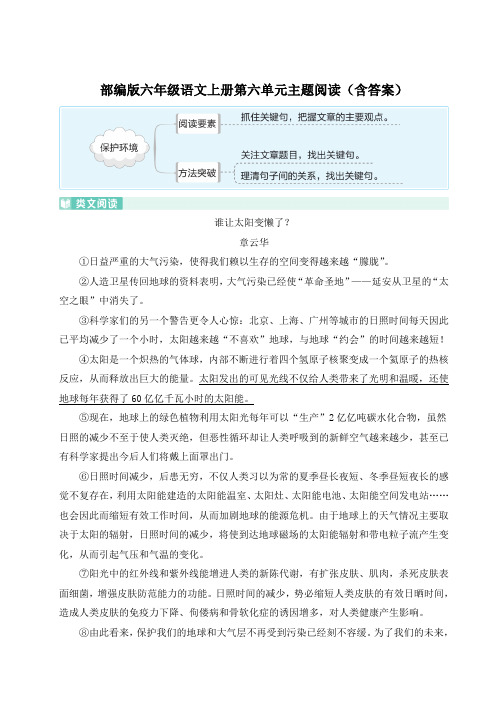
部编版六年级语文上册第六单元主题阅读(含答案)谁让太阳变懒了?章云华①日益严重的大气污染,使得我们赖以生存的空间变得越来越“朦胧”。
②人造卫星传回地球的资料表明,大气污染已经使“革命圣地”——延安从卫星的“太空之眼”中消失了。
③科学家们的另一个警告更令人心惊:北京、上海、广州等城市的日照时间每天因此已平均减少了一个小时,太阳越来越“不喜欢”地球,与地球“约会”的时间越来越短!④太阳是一个炽热的气体球,内部不断进行着四个氢原子核聚变成一个氦原子的热核反应,从而释放出巨大的能量。
太阳发出的可见光线不仅给人类带来了光明和温暖,还使地球每年获得了60亿亿千瓦小时的太阳能。
⑤现在,地球上的绿色植物利用太阳光每年可以“生产”2亿亿吨碳水化合物,虽然日照的减少不至于使人类灭绝,但恶性循环却让人类呼吸到的新鲜空气越来越少,甚至已有科学家提出今后人们将戴上面罩出门。
⑥日照时间减少,后患无穷,不仅人类习以为常的夏季昼长夜短、冬季昼短夜长的感觉不复存在,利用太阳能建造的太阳能温室、太阳灶、太阳能电池、太阳能空间发电站……也会因此而缩短有效工作时间,从而加剧地球的能源危机。
由于地球上的天气情况主要取决于太阳的辐射,日照时间的减少,将使到达地球磁场的太阳能辐射和带电粒子流产生变化,从而引起气压和气温的变化。
⑦阳光中的红外线和紫外线能增进人类的新陈代谢,有扩张皮肤、肌肉,杀死皮肤表面细菌,增强皮肤防范能力的功能。
日照时间的减少,势必缩短人类皮肤的有效日晒时间,造成人类皮肤的免疫力下降、佝偻病和骨软化症的诱因增多,对人类健康产生影响。
⑧由此看来,保护我们的地球和大气层不再受到污染已经刻不容缓。
为了我们的未来,请爱护我们的环境!(摘自《青少年科技博览》)1.【信息提取】“太阳变懒”的根本原因是:_____________________________。
2.【句子品析】第③段“与地球‘约会’的时间越来越短”一句中的“约会”是指______ __________。
大学《批判与创意思考》章节模拟答案
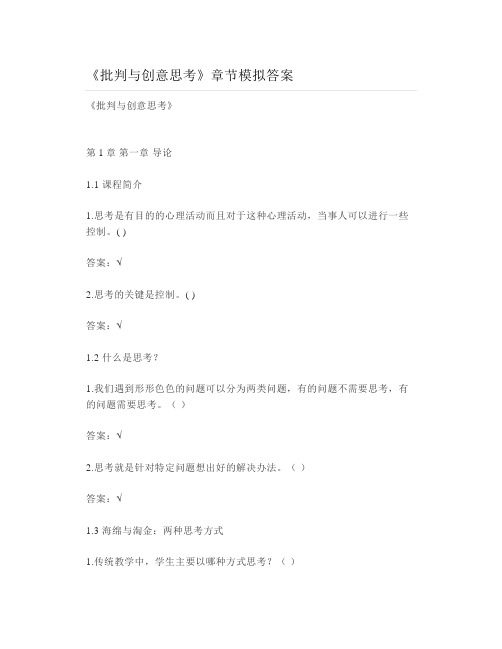
《批判与创意思考》章节模拟答案《批判与创意思考》第1章第一章导论1.1 课程简介1.思考是有目的的心理活动而且对于这种心理活动,当事人可以进行一些控制。
( )答案:√2.思考的关键是控制。
( )答案:√1.2 什么是思考?1.我们遇到形形色色的问题可以分为两类问题,有的问题不需要思考,有的问题需要思考。
()答案:√2.思考就是针对特定问题想出好的解决办法。
()答案:√1.3 海绵与淘金:两种思考方式1.传统教学中,学生主要以哪种方式思考?()A、海绵式B、淘金式答案:A2.海绵式思考和淘金式思考哪一种是较为常见的思考方式是?A、海绵式B、淘金式答案:A3.以下哪种思考方式需要有较强的学习主动性?()A、海绵式B、淘金式答案:B4.海绵式思考是被动接受作者观点与推理但不能评价,淘金式思考是主动发现最有意义的论点和观念并评价。
()A、正确B、错误答案:A1.4 思考的心理学基础(一)1.在思考过程中,以图像和心像进行思考的是?()A、左脑B、右脑答案:B2.在思考过程中,比较偏向直觉思考的是?()A、左脑B、右脑答案:B3.下面属于右脑功能的是()。
A、艺术B、阅读C、写作D、语言答案:A1.5 思考的心理学基础(二)1.赫曼的全脑模型中,逻辑型属于A象限。
答案:√2.赫曼的全脑模型中,C象限是纪律型。
答案:×3.MQ指的是德性商数。
()答案:√1.6 怎样提高创造力?1.日本创造学家进藤隆夫等人提出的创造力不包括()。
A、活力B、好奇心C、结力D、个性答案:B2.创造力中的智力因素不包括()。
A、创造意识B、一般智能C、特殊才能D、批判性思维3.人们的创造力可以通过科学的教育和训练而不断被激发出来,转化为显性的创造能力,并不断得到提高。
()答案:√第2章第二章思考的历程2.1 思考的方法1.生物学家按界、门、纲、目、科、属、种的顺序,把世界上所有的生物分了类,并揭示了各类生物间的关系和联系,这属于什么过程?()A、具体化B、系统化C、分类化D、概括化答案:B2.演绎是什么样的推理方法?()A、从特殊到一般B、从一般到特殊答案:B3.在思考方法中,抽象是高级的分析,概括是高级的综合。
(通用)中考英语任务型阅读20篇(含答案)
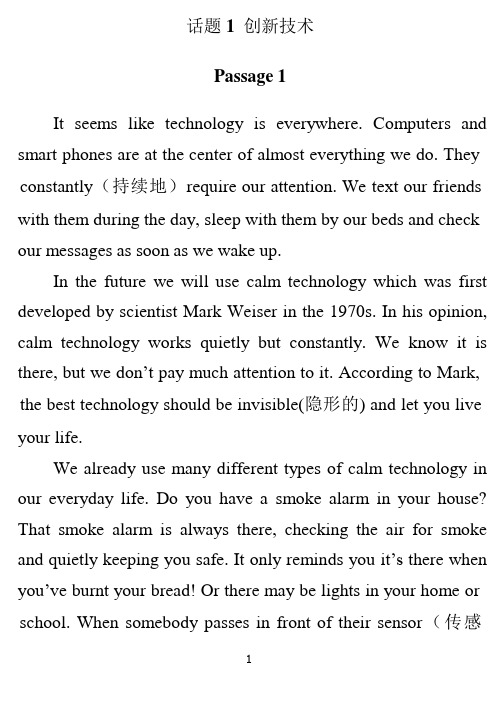
话题1 创新技术Passage 1It seems like technology is everywhere. Computers and smart phones are at the center of almost everything we do. They constantly(持续地)require our attention. We text our fr i ends with them during the day, sleep with them by our beds and check our messages as soon as we wake up.In the future we will use calm technology which was first developed by scientist Mark Weiser in the 1970s. In his opinion, calm technology works quietly but constantly. We know it is there, but we don’t pay much attention to it. According to Mark, the best technology should be invisible(隐形的) and let you li ve your life.We already use many different types of calm technology in our everyday life. Do you have a smoke alarm in your house? That smoke alarm is always there, checking the air for smoke and quietly keeping you safe. It only reminds you it’s there when you’ve burnt your bread! Or there may be lights in your home or school. When somebody passes in front of their sensor (传感器), the lights turn on. You don’t think about this type of technology until you see the light go on.In the future, our houses will use calm technology to open the door for us. Or even to choose the best music for our mood. The minute we walk through the door, our house will respond by turning on the lights and music, and perhaps even starting to prepare our dinner!1~2 题完成句子;3 题简略回答问题;4 题找出并写下第三段的主题句;5 题将文中画线句子译成汉语。
高中语文阅读理解创意被称为创造附答案
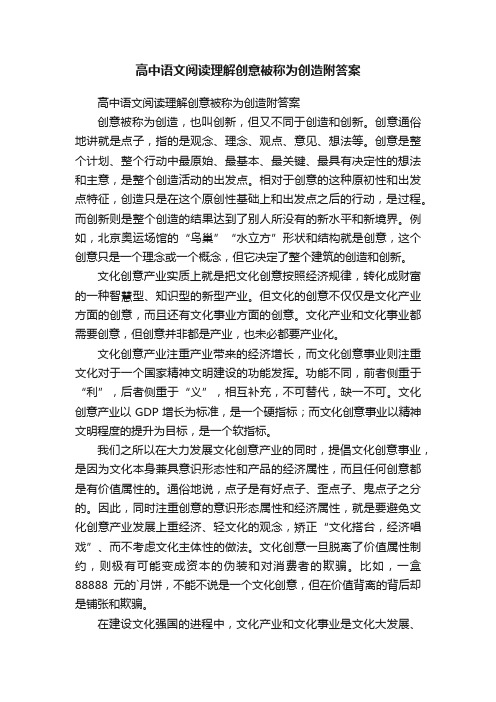
高中语文阅读理解创意被称为创造附答案高中语文阅读理解创意被称为创造附答案创意被称为创造,也叫创新,但又不同于创造和创新。
创意通俗地讲就是点子,指的是观念、理念、观点、意见、想法等。
创意是整个计划、整个行动中最原始、最基本、最关键、最具有决定性的想法和主意,是整个创造活动的出发点。
相对于创意的这种原初性和出发点特征,创造只是在这个原创性基础上和出发点之后的行动,是过程。
而创新则是整个创造的结果达到了别人所没有的新水平和新境界。
例如,北京奥运场馆的“鸟巢”“水立方”形状和结构就是创意,这个创意只是一个理念或一个概念,但它决定了整个建筑的创造和创新。
文化创意产业实质上就是把文化创意按照经济规律,转化成财富的一种智慧型、知识型的新型产业。
但文化的创意不仅仅是文化产业方面的创意,而且还有文化事业方面的创意。
文化产业和文化事业都需要创意,但创意并非都是产业,也未必都要产业化。
文化创意产业注重产业带来的经济增长,而文化创意事业则注重文化对于一个国家精神文明建设的功能发挥。
功能不同,前者侧重于“利”,后者侧重于“义”,相互补充,不可替代,缺一不可。
文化创意产业以GDP增长为标准,是一个硬指标;而文化创意事业以精神文明程度的提升为目标,是一个软指标。
我们之所以在大力发展文化创意产业的同时,提倡文化创意事业,是因为文化本身兼具意识形态性和产品的经济属性,而且任何创意都是有价值属性的。
通俗地说,点子是有好点子、歪点子、鬼点子之分的。
因此,同时注重创意的意识形态属性和经济属性,就是要避免文化创意产业发展上重经济、轻文化的观念,矫正“文化搭台,经济唱戏”、而不考虑文化主体性的做法。
文化创意一旦脱离了价值属性制约,则极有可能变成资本的伪装和对消费者的欺骗。
比如,一盒88888元的`月饼,不能不说是一个文化创意,但在价值背离的背后却是铺张和欺骗。
在建设文化强国的进程中,文化产业和文化事业是文化大发展、大繁荣的两翼,不可或缺,不可偏废。
创意阅读 第三册 翻译及答案
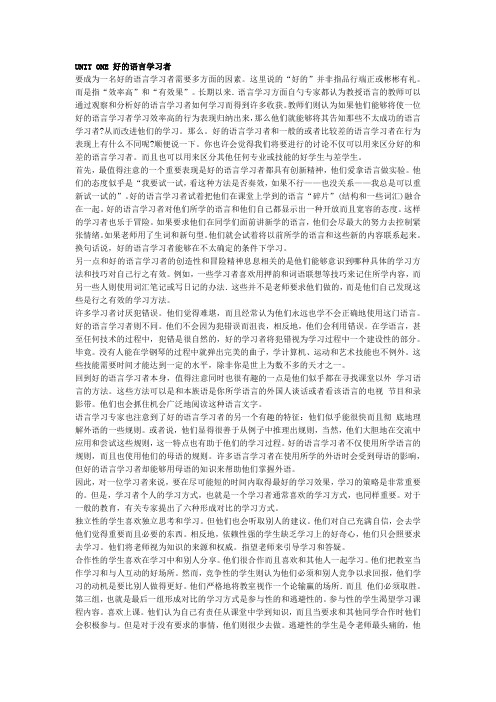
UNIT ONE 好的语言学习者要成为一名好的语言学习者需要多方面的因素。
这里说的“好的”并非指品行端正或彬彬有礼。
而是指“效率高”和“有效果”。
长期以来.语言学习方面自勺专家都认为教授语言的教师可以通过观察和分析好的语言学习者如何学习而得到许多收获。
教师们则认为如果他们能够将使一位好的语言学习者学习效率高的行为表现归纳出来,那么他们就能够将其告知那些不太成功的语言学习者?从而改进他们的学习。
那么。
好的语言学习者和一般的或者比较差的语言学习者在行为表现上有什么不同呢?顺便说一下。
你也许会觉得我们将要进行的讨论不仅可以用来区分好的和差的语言学习者。
而且也可以用来区分其他任何专业或技能的好学生与差学生。
首先,最值得注意的一个重要表现是好的语言学习者都具有创新精神,他们爱拿语言做实验。
他们的态度似乎是“我要试一试,看这种方法是否奏效,如果不行——也没关系——我总是可以重新试一试的”。
好的语言学习者试着把他们在课堂上学到的语言“碎片”(结构和一些词汇)融合在一起。
好的语言学习者对他们所学的语言和他们自己都显示出一种开放而且宽容的态度。
这样的学习者也乐于冒险。
如果要求他们在同学们面前讲新学的语言,他们会尽最大的努力去控制紧张情绪。
如果老师用了生词和新句型。
他们就会试着将以前所学的语言和这些新的内容联系起来。
换句话说,好的语言学习者能够在不太确定的条件下学习。
另一点和好的语言学习者的创造性和冒险精神息息相关的是他们能够意识到哪种具体的学习方法和技巧对自己行之有效。
例如,一些学习者喜欢用押韵和词语联想等技巧来记住所学内容,而另一些人则使用词汇笔记或写日记的办法.这些并不是老师要求他们做的,而是他们自己发现这些是行之有效的学习方法。
许多学习者讨厌犯错误。
他们觉得难堪,而且经常认为他们永远也学不会正确地使用这门语言。
好的语言学习者则不同。
他们不会因为犯错误而沮丧,相反地,他们会利用错误。
在学语言,甚至任何技术的过程中,犯错是很自然的,好的学习者将犯错视为学习过程中一个建设性的部分。
安徽省淮南市2023-2024学年九年级上学期期中语文试题(含答案)
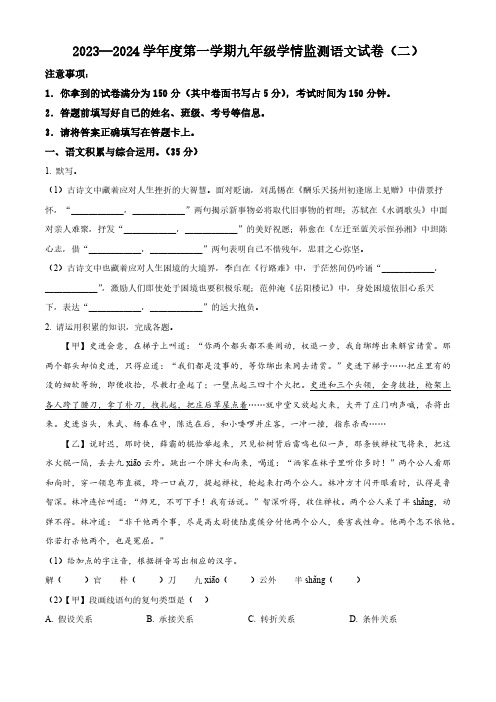
2023—2024学年度第一学期九年级学情监测语文试卷(二)注意事项:1.你拿到的试卷满分为150分(其中卷面书写占5分),考试时间为150分钟。
2.答题前填写好自己的姓名、班级、考号等信息。
3.请将答案正确填写在答题卡上。
一、语文积累与综合运用。
(35分)1. 默写。
(1)古诗文中藏着应对人生挫折的大智慧。
面对贬谪,刘禹锡在《酬乐天扬州初逢席上见赠》中借景抒怀,“____________,____________”两句揭示新事物必将取代旧事物的哲理;苏轼在《水调歌头》中面对亲人难聚,抒发“____________,____________”的美好祝愿;韩愈在《左迁至蓝关示侄孙湘》中坦陈心志,借“____________,____________”两句表明自己不惜残年,忠君之心弥坚。
(2)古诗文中也藏着应对人生困境的大境界,李白在《行路难》中,于茫然间仍吟诵“____________,____________”,激励人们即使处于困境也要积极乐观;范仲淹《岳阳楼记》中,身处困境依旧心系天下,表达“____________,____________”的远大抱负。
2. 请运用积累的知识,完成各题。
【甲】史进会意,在梯子上叫道:“你两个都头都不要闹动,权退一步,我自绑缚出来解官请赏。
那两个都头却怕史进,只得应道:“我们都是没事的,等你绑出来同去请赏。
”史进下梯子……把庄里有的没的细软等物,即便收拾,尽教打叠起了;一壁点起三四十个火把。
史进和三个头领,全身披挂,枪架上各人跨了腰刀,拿了朴刀,拽扎起,把庄后草屋点着……就中堂又放起火来,大开了庄门呐声喊,杀将出来。
史进当头,朱武、杨春在中,陈达在后,和小喽啰并庄客,一冲一撞,指东杀西……【乙】说时迟,那时快,薛霸的棍恰举起来,只见松树背后雷鸣也似一声,那条铁禅杖飞将来,把这水火棍一隔,丢去九xiāo云外。
跳出一个胖大和尚来,喝道:“洒家在林子里听你多时!”两个公人看那和尚时,穿一领皂布直裰,跨一口戒刀,提起禅杖,轮起来打两个公人。
来自蝴蝶翅膀的创意阅读答案

来自蝴蝶翅膀的创意阅读答案来自蝴蝶翅膀的创意阅读答案 1蝴蝶郑振铎春送了绿衣给田野、给树木、给花园;甚至于小小的墙隅、屋角、小小的庭前阶下,也点缀着新绿。
就是油碧色的湖水,被春风粼粼的吹动,山间的溪流也开始淙淙汩汩的流动了,于是黄的、白的、红的、紫的、蓝的,以及不能名色的花开了;于是红的,白的,黄的,黑的,以及各色的蝴蝶们,从蛹中苏醒了,舒展着美的耀人的双翼,栩栩的在花间,在园中飞了;便是小小的墙隅屋角,小小的庭前阶下,只要有新绿的花木在着的,只要有什么花舒放着的,_________________________________。
蝴蝶飞来了,偕来的是花的春天。
当我们在温暖宜人的阳光下,走到一望无际的开放着金黄色的菜田间,或杂生着不可数的无名的野花的草地上时,大的小的蝴蝶们总在那里飞翔着。
一刻飞向这朵花,一刻飞向那朵花,便是停下了,双翼也还在不息不住的扇动。
一群儿童们嬉笑着追逐在它们之后,见它们停下了,便悄悄的蹑足走近,等到他们走近时,蝴蝶却又态度闲暇的舒翼飞开了。
“啊,蝴蝶!它便被追,也并不现出匆急的神气。
”在这个时候,我们似乎感到全个宇宙都耀着微笑,都泛滥着快乐,每个生命都在生长,在向前或向上发展。
1.语段中“以及不能名色的花开了”中“不能名色”的词义是________ _________。
2.文中第一自然段空出了末句,与上文衔接最好的一项是()A.栩栩的蝴蝶们也都飞来了 B.蝴蝶们也都栩栩的来临了C.都迎来了栩栩的蝴蝶们 D.都栩栩的飞来了蝴蝶们3.文中着力描写哪些景物(至少写出10种景物)?4.从哪些画面为我们勾画出一幅生机勃勃的春景图?5.借助于对春天景物的描写,抒发了自己怎样的思想感情?(不超过20个字)6.“啊,蝴蝶!它便被追,也并不现出匆急的神气。
”这句话表现了蝴蝶什么特点?(不超过5个字)蝴蝶《答案》:1.不能说出颜色。
2.B3.田野、树木、花园、墙隅、屋角、庭院、湖水、溪流、春花、蝴蝶、菜田、草地4.湖面微波荡漾、溪流淙淙汩汩、五颜六色的鲜花争芳斗妍、蝴蝶翩翩飞舞、群童嬉逐蝴蝶。
2023年中考语文试卷含答案(七)

2023年中考语文试卷含答案(七)一、阅读下面的实用类文本,完成各题。
(10分)阅读文创产品如何破解同质化难题①文创产品指以文化为主题或基本元素,在设计、加工、营销等环节融入创新意识,兼具文化内涵与创新属性的产品。
小到一张贴纸、一对耳环,大到一个电视节目、一处旅游景点,都可以被赋予特定的文化内涵,打造为文创产品。
②优秀的文创产品不仅可以表达文化、传承文化,更能推动文化产业发展,助力经济增长。
中央广播电视台制作的文创精品《国家宝藏》节目,别出心裁地将有代表性的中国文物与电视舞台剧的艺术表现形式结合起来,讲述中国文物宝藏的前世今生。
节目播出后,故宫博物院等多家国家级博物馆的参观人数大幅增加,“为一座博物馆赴一座城”成为旅游打卡的新趋势。
③优秀的文创产品带来了消费热潮,文创产品的同质化问题也随之出现。
某地青砖灰瓦的传统建筑成了旅游热点,不久各地就都建起了“仿古主题小镇”—一满街青砖灰瓦,哪怕完全不符合当地的历史建筑形态。
一个景区以本地景观为造型的文创雪糕上热搜了,其他景区便亦步亦趋,群起售卖类似的文创雪糕——造型虽然有所不同,吃到嘴里都是一样的甜腻。
④文创产品开发设计的周期长、成本高、难度大,而一旦出现爆款,优秀的文创产品被证明了能获取利润,又很容易被一窝蜂地复制模仿。
文创产品的同质化,使其难以维系品牌溢价,只能靠简单粗暴的降价来争夺市场。
越来越微薄的利润,必然会打击研发投入的积极性,导致“盲目模仿一生意惨淡”的恶性循环。
⑤消费者购买文创产品,是为了感受不一样的文化与创意。
如果天南和海北没区别,这里和那里一个样,文创产品的意义在哪里?归根结底,文创产品靠满足人们的精神需求营利。
当今人们缺的不是消费能力,而是消费欲望。
如果文创产品的文化内涵和创意元素能够引发消费者的情感共鸣,多数人都愿意为之买单。
否则,消费者的体验感自然大打折扣。
⑥想要破解文创产品同质化难题,当然离不开知识产权保护意识的增强,但文创产品的开发也是关键。
河北省邢台市2023-2024学年高二上学期名校质检联盟第四次月考语文试题(含答案)

2023-2024学年高二(上)质检联盟第四次月考语文考生注意:1.本试卷共150分,考试时间150分钟。
2.请将各题答案填写在答题卡上。
3.本试卷主要考试内容:部编版选择性必修中册第1~5课,第9~11课。
一、现代文阅读(35分)(一)现代文阅读Ⅰ(本题共5小题,19分)阅读下面的文字,完成1~5题。
材料一:“创意”有多种理解,但它经常被一些学者过分强调其“新颖性”“新奇性”“独创性”“个人性”,而有意无意忽视其同样重要的“实用性”“有价值”“适切”等属性,这种认识和做法是狭隘的。
实际上,一切创意都是针对问题而来的,没有问题,所谓的“创意”就是空洞的表演、盲目的花样翻新。
“实用性”是“独创性”的前提。
简言之,创意针对的是问题,是对所需要解决问题的一个最专业、最科学且最经济的解决途径。
在这个意义上,创意写作是否等同于文学写作,写作的创意性是否等同于文学性并不重要,重要的是能否面对今天无限而具体的写作需要提供形式与内容上的,如跨文体、跨形态、跨业态等“适切”“有价值”的支持。
在市场经济深入社会每一个细处的今天,写作包括文学写作实际上早已经成为文化产业的一部分,它们是否有价值,是否被需要,取决于它们是否能够成为某种特殊产品,提供等值的精神、审美或者其他需要。
在市场语境下,写作可以对作者提出要求,但是不能反过来对读者、对消费者提出要求,比如,自我表达是作者的权利,但接受作者的自我表达不是读者的义务,而是后者的选择。
文学创作与文学阅读当然是一种需要,但在纸媒文字中心向视觉中心、数字中心转向的今天,电视节目、电视剧、电影、短视频、数字作品剪辑、动漫、游戏等才是更多接受者的选择,而面向上述领域包括剧本、游戏文案、文旅策划、短视频脚本、超文本制作、元宇宙世界观的“众筹”、IP的二度创作等新领域的写作,且能满足制作方、消费市场、政策规则等方方面面的需求的写作,方可称之为今天的“创意写作”。
当然,从事纸媒文字写作只要存在需要,它一定天然地具有创意性,而这种“创意性”是相对于文字需要而言的,过去我们将之称为“陌生化”或者“文学性”“诗意”,今天我们可以称之为“创意”或者满足需求。
儿子的创意阅读训练及答案

儿子的创意毕淑敏儿子在家里乱翻我的杂志。
突然说:“我准备到日本旅游一次。
因为他经常异想天开,我置之不理。
他很郑重地说:“这上面写着一个有关宗教博物馆建筑的创意征文比赛。
金牌获得者,免费到日本观光旅游。
说着,把一本海外刊物递给我。
我看也不看地说:“关于宗教,你懂得多少?关于建筑,你懂得多少?你还是好好做功课吧。
”他毫不气馁地说:“可是我有创意啊,比如博物馆里可以点燃藏香,给人一种浓郁的宗教气氛。
比如博物馆里可以卖斋饭,让人色香味立体地感受宗教,比如……”我打断他说:“别比如了,我记得你小时候连积木都搭不好,还侈谈什么建筑!”十几岁的儿子好脾气,不理睬我的挖苦,自语道:“在地面挖一个巨大的深坑,就要100米吧,然后把这个博物馆盖在底下……”我说:“噢,那不成了地下宫殿?”儿子不理我,遐想着说:“博物馆用透明的建筑材料砌成外墙,这样,参观的人们时时刻刻会感到土地的存在,产生一种神秘感,地面部分设计成螺旋状的飞梯,象征着人类将向宇宙探索……”他在空中比划了一个上大下小的图形。
我不客气地打断他:“挖到地下那么深的地方,会有水涌出来,积成一个火山口样的湖泊。
你想过没有?还有你设计的飞梯,空中的螺旋状,多么危险!还有……”儿子摆摆手说:“妈,您说的问题都是问题。
不过那是工程师们的事,不关我的创意。
妈妈,您知道什么是创意吗?那就是最富于创造性的意见啊!”我叹了一口气说:“好了,随你瞎想好了。
不过我要提醒你一句,对于一个学生来说,我以为最好的创意莫过于一个好成绩了。
”儿子在电脑上完成了他的创意。
付邮之前,我说:“可以让我看看你的完成稿吗?”他翻了我一眼说:“您是评委吗?”我只好一笑了之。
很长时间过去了,儿子收到了一个写着他的名字并称他为“先生”的大信封。
是那家征文发起部门寄来的。
我们拆开信,里面是一张请柬,邀请儿子到海外参加发奖仪式。
儿子苦恼地说:“现在赶去也来不及了。
再说他们也没说清我是不是获奖者。
”我说:“还不死心啊?邀请你参加发奖,已是天上的面子。
12事物的正确答案不止一个

——陶行知
多角度语言思维训练②
小鸡 为什么过马路?
• 欧阳修:小鸡之意不 在马路,在乎山水之 间也。
• 唐僧说:等你明白了 舍生取义,自然会和
这只鸡一起去过马路 的。
• 钱钟书:马路这边的 鸡想跑过去,马路那 边的鸡想走过来——
• 拿破仑:不想过马路 的鸡不是好鸡。
• 爱因斯坦:究竟是鸡 过马路,还是马路过 鸡,取决于你的参考 坐标。
论据:
证明论点的材料、依据。
论据有 事实论据和 道理论据。
论证: 用论据来证明论点的过程。
论证方法有
举例论证、引用论证、对比论证、 比喻论证。
自读要求
1、认真朗读课文,说出作者观点。 2、围绕这个观点,作者阐述了那几个 问题,在文中划出概括性的语句。
整体感知
文章的论点是什么? 本文论述了哪几个问题?
2.罗兰·布歇尔把电视接收器作为试验对象,发 明了对战型的乒乓球游戏,从此开始了游戏 机的革命。
这两个事例是为了证明什么道理?
“发挥创造力的真正关键,在于如何运用知识”
请补充一些例子来证明创 造必须要有持之以恒的精神和 毅力。
爱迪生用白金、黄金等各种金属丝做实验, 前后试过的材料不下1600种,终于发明了 电灯。
进行各种尝试。
这一段的中心句是?文中用什么方 法证明这一观点?
创造性的思维有哪些要素?
1. 总是孜孜不倦地汲取知识,使自己学 识渊博。
2. 有探求新事物,并为此而活用知识的 态度和意识。
3. 持之以恒地进行各种尝试。
作者是如何来论证他的观点的?
举例论证:
1.约翰·古登贝尔克将葡萄压榨机和硬币打制器 组合起来,发明了印刷机和排版术。
“正确答案只有一个”这种思维模式,在我们头脑 中已不知不觉地根深蒂固。
2020北京海淀高三(上)期中语文含答案

2020北京海淀高三(上)期中语文2020.11 本试卷共8页,150分。
考试时长150分钟。
考生务必将答案答在答题纸上。
在试卷上作答无效。
考试结束后,将本试卷和答题纸一并交回。
一、本大题共5小题,共17分。
阅读下面材料,完成1-5题。
材料一随着我国居民精神文化消费比重的显著提高,人们开始追求个性化,差异化的商品,关注其蕴含的精神内涵。
在互联网技术的助推下,信息交流,品牌文化传播等不断增强,许多基于中华优秀传统文化开发设计的文创产品呈热销态势,由此带动了文创产业的持续发展。
在这一热潮中,也存在产品开发同质化、定位模糊、质量不高等问题。
那么,如何通过文创产品使优秀传统文化焕发生机,成为滋养当代人生活的养分呢?文创产品研发的重心应是实现从文化遗产到文化资源的转化,而文化遗产转化为文化资源,关键之处在于对文化精神的创新表达。
从传统造物的形状、色彩、纹饰中提取元素,把它凝练为直观鲜明的文化艺术符号,形成具有中国特色的文创产品,是较为常见的设计方式。
比如故宫文创的口红,膏体颜色取自故宫院藏国宝器物,外观取自宫廷绣裳纹饰;敦煌文创的胸章,选用六合莲花等盛唐时期的藻井纹饰。
文创产品的创新设计,不仅__________,而且____________。
比如有的文创产品围绕二十四节气发挥创意,表现人与自然、物候之间的联系;有的文创产品运用“图必有意,意必吉样”的造型语言,表现中国人追求美好生活、积极向上的态度;有的文创产品展视中华悠久历史文化,表现中华文明海纳百川的广阔胸襟。
中华文化保存在典籍文献,遗址文物中,更蕴藏在人们衣食住行用的目常生活里。
文化传统只有存续在生活中,才能不断焕发生机与活力。
过去,不少文博场馆的纪念品远离生活,缺乏创意。
消费者买来后,大多将其置于角落,任其蒙尘。
当下,一系列文创产品从日常生活需要出发进行创意设计:小到胶带,便笺、行李牌,大到公共空间的装饰品;古典的如古器复刻,新颖的有数码周边;时令性的如春茶、月饼、夏季的遮阳帽,冬天的披肩。
创意文学阅读与分析模拟试题
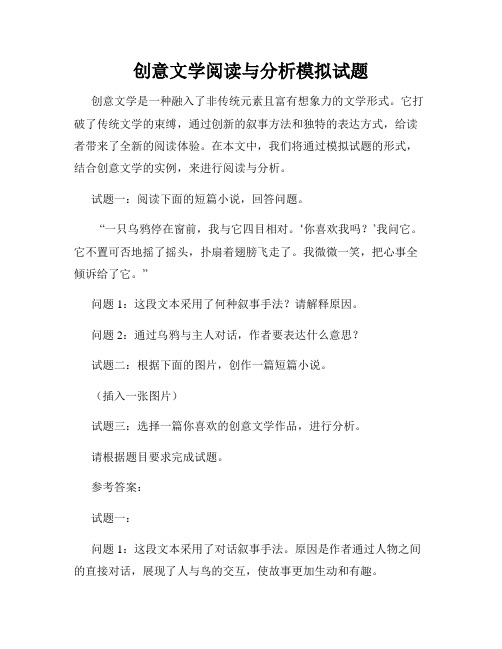
创意文学阅读与分析模拟试题创意文学是一种融入了非传统元素且富有想象力的文学形式。
它打破了传统文学的束缚,通过创新的叙事方法和独特的表达方式,给读者带来了全新的阅读体验。
在本文中,我们将通过模拟试题的形式,结合创意文学的实例,来进行阅读与分析。
试题一:阅读下面的短篇小说,回答问题。
“一只乌鸦停在窗前,我与它四目相对。
‘你喜欢我吗?’我问它。
它不置可否地摇了摇头,扑扇着翅膀飞走了。
我微微一笑,把心事全倾诉给了它。
”问题1:这段文本采用了何种叙事手法?请解释原因。
问题2:通过乌鸦与主人对话,作者要表达什么意思?试题二:根据下面的图片,创作一篇短篇小说。
(插入一张图片)试题三:选择一篇你喜欢的创意文学作品,进行分析。
请根据题目要求完成试题。
参考答案:试题一:问题1:这段文本采用了对话叙事手法。
原因是作者通过人物之间的直接对话,展现了人与鸟的交互,使故事更加生动和有趣。
问题2:通过乌鸦与主人对话,作者要表达的含义是人与动物之间的沟通和心灵的交流是可能存在的。
虽然乌鸦没有给出具体的回答,但它的反应和作者微笑的举动表明了主人对这段对话的理解和满足。
试题二:(插入一篇根据图片创作的短篇小说)我站在高楼的窗前,俯瞰着熙熙攘攘的城市。
人们匆匆赶路,楼宇拔地而起,车水马龙。
而我身边,却是一片荒凉寂静。
这里没有人烟,只有几棵矮小的树和一条蜿蜒的小溪。
突然,我看到一只小小的耗子爬了出来,它眯着眼睛紧盯着远处。
我好奇地凑过去,也看向它注视的方向。
仅过了几秒,我发现一个巨大的狼影从远方逐渐靠近,它的眼神如同饥饿的野兽,让人不寒而栗。
耗子突然朝我轻轻点了点头,然后一下子蹿向了河边的丛林中。
我陷入了疑惑,它为何点头示意?难道是要我跟随它?我心中一动,毫不犹豫地顺着小耗子的指引,钻进了茂密的丛林。
经过一番艰难的跋涉,我终于看到了一个神秘的花园。
这里的花朵绽放得如此艳丽,果实散发着诱人的香气。
我忍不住走近,小心翼翼地采摘了几朵。
当我回到城市时,耗子已经不见了。
- 1、下载文档前请自行甄别文档内容的完整性,平台不提供额外的编辑、内容补充、找答案等附加服务。
- 2、"仅部分预览"的文档,不可在线预览部分如存在完整性等问题,可反馈申请退款(可完整预览的文档不适用该条件!)。
- 3、如文档侵犯您的权益,请联系客服反馈,我们会尽快为您处理(人工客服工作时间:9:00-18:30)。
Words to note: 12, 8, 13, 14, 10, 15, 2, 5, 16, 11, 4, 7, 1, 6, 3, 9
Understanding the text:
Part A: 1. They gave clocks to Chinese and the phrase "give a clock" sounds like "make a funeral arrangement".
Corrections:
2. In America Katy had no interest in her Chinese background.
3. It was Sam’s first time to visit Katy.
4. Katy does not like spending time with Sam at first.
6. The Garbage Project can give a clear impression of how people live and behave.
Part B: F, F, T, F, F, T
Corrections
5. There are two reasons for this. The first is that people do not want to be seen as wasteful when it comes to food. They say (and think) they throw away less food than they actually do. The other reason is that they know they should be eating less junk food and more healthy food, but in fact the evidence from the garbage is that they eat more junk food. They are not deliberately lying; they just have an inaccurate impression of their own eating habits.
5. remember the country's religion, avoid giving things that are not appropriate, and chose the wrapping paper carefully.
Unit Two Horoscopes
Unit 6 The Archaeology of Today
Words to note: 10, 4, 6, 17, 9, 1, 12, 3, 14, 2, 18, 5, 13, 11, 16, 8, 7, 15
Understanding the text
Part A: 1. It is important because it contains a great deal of evidence about how people in a society lived their everyday lives.
2. Families do not sit down together to have lunch.
3. People like to try different kinds of food from different countries.
5. The meal called tea includes tea, sandwiches and pasties with cream and jam..
2. Varied answers.
3. Cartoons and crosswords.
4. Traveling overseas.
5. The horse.
6. Power, passion and daring.
4. That is the day when Katy fell in love with Sam.
5. Because he thinks that Katy is too good for him.
6. Katy now feels that she is really Chinese and that she has discovered her roots.
Part B: F, T, F, F, F, T, F, F
Unit Three Astronomy
Words to note: 9, 3, 15, 2, 7, 1, 10, 14, 4, 12, 5, 11, 6, 8, 13
Understanding the text:
1. It was started in Arizona, but has now expanded to cover many other American cities and even Mexico City as well.
2. There are too many households in Tucson to collect from each and every one. Therefore, only a sample of households had their rubbish collected. Also, there is no time specified in the text, it simply says “over a period of time”.
2. Because she went to a local school, spoke English to her friends and had no interest in her Chinese background.
3. Because everything is new or strange for him.
7. Sam goes away to China because it’s the end of his holiday.
9. Sam is happy to see Katy.
10. Katy stayed with Sam in China.
Part B: 1. Because it is about her.
2. The Garbage Project is a research project carried out by the University of Arizona. It studies the garbage in city rubbish dumps to find evidence of the lifestyles of the local population. It started in 1973 in Tucson, but has now expanded to many other cities and has built a huge database of information on most aspects of modern American life.
Unit 5 A Romantic Story
Words to note: 6, 12, 4, 9, 1, 10, 15, 2, 11, 3, 13, 5, 14, 7, 16, 8
Understanding the text
Part A: T, F, F, F, Tห้องสมุดไป่ตู้ T, F, T, F, F
2. they may be seen as inappropriately romantic.
3. wrapped and presented correctly.
4. they don't want the donor to lose face if the gift is not appropriate.
3. The garbage is sorted into a variety of categories (food items, dangerous materials, personal items etc.).
4. This is because when there is a shortage of something, people try to hoard large supplies of the item. They may buy too much. This frequently means that the item needs to be thrown away before it can be used – perhaps because of a shortage of storage space or because it starts to perish.
7. The second new-moon day after the winter solstice.
8. Because some signs are believed to be incompatible with others and therefore a bad marriage will result.
Words to note: 7, 5, 12, 9, 1, 15, 2, 3, 10, 6, 13, 16, 4, 11, 14, 8
Understanding the text:
Part A: 1. The Western horoscope is divided into 12 star signs.
Part A: 8, 5, 2, 6, 3, 7, 1, 4
